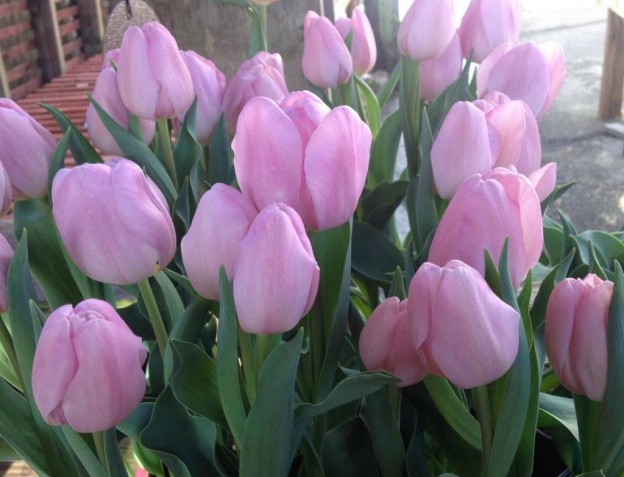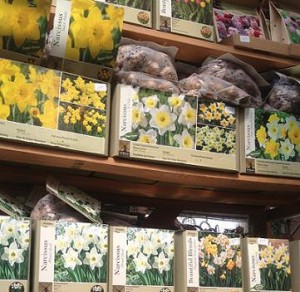
So many to choose from…
Want to be extra happy next spring? Start planning now for your spring garden to include more bulbs. They’re so easy to overlook in the fall since they don’t have flashy flowers to tempt you, but you’ll be so happy you took the time to plant them when their pretty flowers appear next March, April and May!
This fall’s bulb shipment has arrived, and the varied selection includes packages of tulips already mixed in beautiful color combinations. The important thing to remember when buying tulip bulbs is to buy them early and refrigerate them. Other bulbs you can purchase early simply to get the best selection, then keep them cool and dry until the time is right for planting all your bulbs, generally November into December here in the south.
Refrigerating the tulip bulbs at least 8 weeks is important for all of us who live in our warm climate where the winter soil temperatures don’t get cold enough for tulip bulbs to flower well. In the north, folks can buy their bulbs and plant them directly in the soil in the fall. Here, we’re tricking them into thinking they’re going through weeks of necessary winter chilling. Remember also that tulip bulbs should be treated like an annual and pulled out when they’re finished blooming.
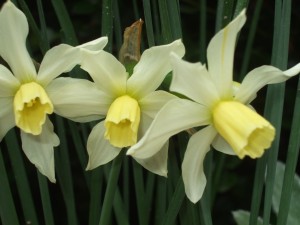
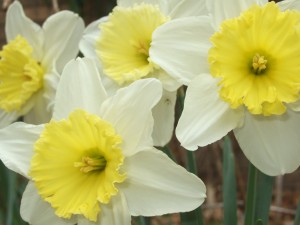
Large blooming ‘Ice Follies’
In addition to the tulip bulb mixes, there are also many packages of narcissus. The smaller blooming varieties are perennial here and won’t need to be replanted each year. With names like ‘Sailboat’, ‘Minnow’, ‘Sun Disc’, ‘Thalia’ and ‘Baby Moon’, just to list a few, how can you resist? These smaller bulbs come in packages of 12, and it’s best to plant them in groups in your garden, to make more of an impact each year.
For all of you who like the big yellow and white blooms of daffodils, we have those too. ‘Dutch Master’ and ‘Mount Hood’ are favorites with their big blossoms on tall stems, and just a few in a vase are so beautiful.
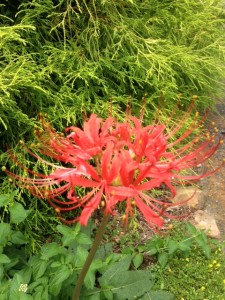
Lycoris radiata
Each year we also have some of the lycoris , or red ‘Surprise Lily’ bulbs. You’ve no doubt seen them blooming around town late in the summer, the long stems appearing, seemingly out of nowhere with their spidery red blooms. I have forgotten where I’ve planted them, and it’s always a happy surprise when they show up again each year. When they’re finished blooming, strap-like foliage will appear, persist all winter and then die down in the spring.
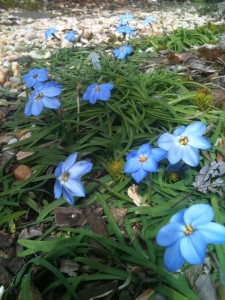
Ipheion ‘Rolf Fiedler’
Another of my favorite bulbs is the old fashioned ipheion. It’s a tiny naturalizing bulb, meaning it will spread gradually where it is happy, generally in a sunny, open area. They come in shades of blue, purple and white; however, the one we have is the sky blue ‘Rolf Fiedler’. There are 18 tiny bulbs in a package, easy to plant and worth it too! You’ll see blooms late spring to early summer on these diminutive plants.
Another good one to have in the landscape or pots is muscari or grape hyacinth. These small bulbs will spread if conditions are favorable and add even more color to the early spring garden.
Planting Tips For Bulbs:
Always plant your bulbs twice the depth of the bulb itself. For example, if a tulip bulb is 2″ long, plant it at least 4″ deep. There’s no need to plant tulip bulbs any deeper here in the south. The reason folks up north plant deeper is to protect the bulb from freezing. Our soil doesn’t stay below freezing long enough for this to be an issue.
Fertilize with a bulb booster fertilizer at planting time and fertilize established bulbs in the fall with a granular fertilizer as well. If you miss this fall feeding, you can also fertilize them in February with a liquid, even-formula fertilizer like Jack’s . A liquid feed is better in the spring since it will reach the root system faster than a slow release granular will.
By Kris Blevons

